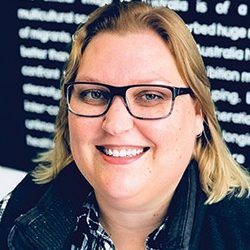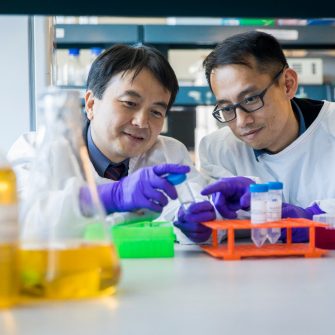Master of Infectious Disease Intelligence
- Commencing Terms
- Term 1, 2 & 3
- Duration
- 1 Year(s)
- Delivery Mode
- Face-to-face (includes blended), Online
- Campus
-
Kensington
- Codes
- CSP UAC code 910850
- Full Fee UAC Code 910851
- Program code 8362
- CRICOS code 089223E
-
Commonwealth Supported Places are available for this program2026 Indicative CSP first year fee
- $9,500*
-
2026 Indicative CSP fee to complete degree
- $9,500*
-
2026 Indicative first year full fee
- $60,500*
-
2026 Indicative full fee to complete degree
- $61,500*
Application closures for 2026
International applications for all undergraduate programs, as well as postgraduate programs offered by the faculties of Arts, Design & Architecture, Engineering (excluding Master of Information Technology and associated programs) and Science are now closed to New Overseas Student Commencement (NOSC) for 2026 intakes.
Postgraduate programs offered by the Business School and the faculties of Law & Justice and Medicine & Health remain open. Master of Information Technology (and associated programs) also remain open.
- Overview
- Entry requirements
- What will I study?
- Future careers
- How to apply
- Fees & Scholarships
Overview
Despite our improved understanding of the epidemiology and control of infectious diseases, emerging and re-emerging infectious diseases pose ongoing threats to global health security.
The Master of Infectious Diseases Intelligence takes a cross-sector approach to the prevention and control of infectious diseases. Gain the advanced disciplinary knowledge and skills required to improve population health outcomes in the control of infectious diseases and health emergencies, across a range of contexts and settings. You’ll graduate with an advanced understanding of the public health aspects of infectious disease surveillance and intelligence, outbreak investigation and response, and infection prevention and mitigation.
This program is designed for professionals wanting to gain an advanced understanding of infectious diseases intelligence in the era of emerging disease threats, as well as management approaches for the identification, assessment, prevention and control of infectious diseases.
Key features
- Wide range of career opportunities
Our graduates find work across a range of employers, including ministries and departments of health, government organisations, NGOs, international health organisations and primary care and community healthcare services in both public and private sectors.
- Research extension options
The Master of Infectious Diseases Intelligence (Extension) gives you the opportunity to extend your knowledge and skills in research through additional research methodology courses and/or an advanced research project. You can design your program to be eligible to apply to pursue a PhD to further advance your career.
- Dual degree options
Make the most of your studies by completing two master’s degrees within 1.7 years. You can combine this degree with the master’s programs in health leadership and management, public health or global health. Studying two programs concurrently enhances your career prospects and gives you the opportunity to combine knowledge and skills from two related disciplines.
- Industry relevant program
This program is designed to be relevant to the workplace, with many opportunities to apply theoretical knowledge to practice. One such opportunity is our internship program, where you’ll gain practical experience in relevant health organisations. We offer a range of domestic and international internship placements in Australia, Asia and the Pacific.
- Flexible delivery
Complete your study from anywhere in the world. This degree provides flexible learning options so you can complete the degree according to your needs and commitments. Courses can be taken online or face-to-face, full-time or part-time. Our online learning spaces facilitate collaborative learning so you can connect with fellow students and course convenors in real-time.
Why study at UNSW?
We're a global leader in research and impact
Recognised for our excellence, we rank #20 globally for public health research (Shanghai Ranking's Global Ranking of Academic Subjects (GRAS), 2024). Our research addresses both existing and emerging complex health challenges in Australia and across the world. By leveraging cross-disciplinary partnerships, innovation and a health system-level approach, we strive to improve health outcomes for all.
Join a sector-leading population health community
UNSW's Medicine & Health faculty is ranked #54 globally for life sciences and medicine (QS World University Rankings by Subject, 2025) and is creating the leaders of tomorrow. Join a community that’s playing a key role in enhancing population health and healthcare systems. This program is delivered by the School of Population Health – a dynamic, international community of staff, alumni, practitioners and students. Our multi-disciplinary teaching and research staff have research and practitioner experience in local, national and international settings. Research and collaboration opportunities are available for students in our internationally recognised research centres and institutes. You will be part of a community involved in translating ground-breaking research into disease prevention and response strategies and informing health policy.
Build your professional network
Join an engaged cohort of like-minded students and a successful alumni community. Our graduates currently hold leadership roles in public and private services spanning ministries/departments of health, local health districts, public service roles relevant to social determinants of health, non-government organisations across Australia and around the world, in addition to graduates who bring population health expertise to their clinical work.
Want to see more from UNSW Medicine and Health?
Entry requirements
There are two pathways for entry and a third exceptional pathway. These include:
Pathway 1
Applicants must have both:
a) A three year undergraduate degree in any field of study. See the list of relevant fields of study below.
b) Two years of full-time professional or volunteer experience in a relevant field. The professional experience may include experience in health or public health services acquired as part of a degree of four or more years' duration, e.g. MBBS, MD. Refer to the list of professional or volunteer experience below.
Pathway 2
Applicants must have at least one of the following:
a) An undergraduate degree plus an honours in a relevant field of study. See the list of relevant fields of study below.
b) A postgraduate degree in a relevant field of study. Refer to the list of relevant fields of study below.
Pathway 3
In exceptional circumstances, applications will be considered for entry when they have extensive professional health or public health experience but do not hold a relevant degree qualification. A minimum of five years full-time relevant professional experience is required and an interview with the School of Population Health may be conducted.
Relevant fields of study
Accepted areas of study include:
- medicine
- nursing
- allied health
- health sciences
- biomedical sciences
- dentistry
- social sciences
- social work
- psychology
- paramedicine
- environmental health
- health administration
- policy studies
- development studies
Professional or volunteer experience
Relevant professional experience includes:
- Roles in health (including allied health, medicine, nursing, oral health, public health, environmental health and psychology)
- Health service provision or health management roles in human services (e.g., social work, community development, service navigation, case management)
- Roles that involve working specifically on health-related activities or portfolios, such as health-focused positions in emergency services, management, research, engineering, law, science, mathematics and statistics, economics, journalism or policy.
Indigenous Alternative Entry Scheme
Aimed at redressing the imbalance of access for Aboriginal and Torres Strait Islander peoples to population health programs, this scheme provides entry to our postgraduate coursework degrees based on your interest in public health and relevant educational and/or professional experience.
English language requirements
You may be asked to provide evidence of your English proficiency to study at UNSW depending on your educational background and citizenship. English language skills are vitally important for coping with lectures, tutorials, assignments and examinations - this is why UNSW requires a minimum English language competency for enrolment.
If you’re completing an Australian Year 12 qualification (e.g. NSW HSC or equivalent), you do not need to provide anything extra to prove your proficiency. Your qualification will be used as evidence of your English proficiency.
If you do need to provide evidence of your English proficiency, this will be indicated in your application. You can prove this by providing evidence that you meet one or more of the following criteria:
- English language tests and university English courses
- Prior study in the medium of English
- Other qualifications
If you need to improve your English skills before you start your degree, UNSW College’s Academic English Programs are for you. The programs are suitable for various English levels and help you prepare for university studies and life in Australia.
For more details, visit the English Language Requirements page.
There are two pathways for entry and a third exceptional pathway. These include:
Pathway 1
Applicants must have both:
a) A three year undergraduate degree in any field of study. See the list of relevant fields of study below.
b) Two years of full-time professional or volunteer experience in a relevant field. The professional experience may include experience in health or public health services acquired as part of a degree of four or more years' duration, e.g. MBBS, MD. Refer to the list of professional or volunteer experience below.
Pathway 2
Applicants must have at least one of the following:
a) An undergraduate degree plus an honours in a relevant field of study. See the list of relevant fields of study below.
b) A postgraduate degree in a relevant field of study. Refer to the list of relevant fields of study below.
Pathway 3
In exceptional circumstances, applications will be considered for entry when they have extensive professional health or public health experience but do not hold a relevant degree qualification. A minimum of five years full-time relevant professional experience is required and an interview with the School of Population Health may be conducted.
Relevant fields of study
Accepted areas of study include:
- medicine
- nursing
- allied health
- health sciences
- biomedical sciences
- dentistry
- social sciences
- social work
- psychology
- paramedicine
- environmental health
- health administration
- policy studies
- development studies
Professional or volunteer experience
Relevant professional experience includes:
- Roles in health (including allied health, medicine, nursing, oral health, public health, environmental health and psychology)
- Health service provision or health management roles in human services (e.g., social work, community development, service navigation, case management)
- Roles that involve working specifically on health-related activities or portfolios, such as health-focused positions in emergency services, management, research, engineering, law, science, mathematics and statistics, economics, journalism or policy.
English language requirements
You may be asked to provide evidence of your English proficiency to study at UNSW depending on whether you are from an English-speaking background or non-English speaking background. English language skills are vitally important for coping with lectures, tutorials, assignments and examinations - this is why UNSW requires a minimum English language competency for enrolment.
If English is not your first language, you’ll need to provide proof of your English proficiency before you can be given an offer to study at UNSW. You can do this by providing evidence that you meet one or more of the following criteria:
- English language tests and university English courses
- Prior study in the medium of English
- Other qualifications
If you need to improve your English skills before you start your degree, UNSW College’s Academic English Programs are for you. The programs are suitable for various English levels and help you prepare for university studies and life in Australia.
For more details, visit the English Language Requirements page.
Check the specific English language requirements for this program
What will I study?
UNSW is introducing a new academic calendar from 2028.
We are moving to a new flex-semester calendar. What does this mean for your studies?
Program structure
Through the Master of Infectious Diseases Intelligence, you’ll learn the multi-disciplinary, public health approach needed for infectious diseases control. You’ll graduate with a sophisticated understanding of epidemic patterns and the critical analysis and application of this knowledge for real-world impact.
You’ll study under the guidance of internationally recognised staff, learning about and gaining hands-on experience in critical areas of infectious diseases intelligence, including:
- current and future infectious disease challenges
- disease surveillance
- outbreak investigation and implementing infection prevention and control programs
- emergency response
- research
- infectious disease epidemiology.
Full program structure
The Master of Infectious Diseases Intelligence can be completed in one year of full-time study or two years part-time. The program is made up of eight courses total, including:
- five core courses
- three elective courses
-
Please visit the program handbook to view the elective courses on offer.
-
The graduate certificate and graduate diploma provide an articulation pathway into the Master of Infectious Diseases Intelligence.
-
You can choose to extend your Master of Infectious Diseases Intelligence degree or combine it with another degree.
Extension degree: An extension to this degree includes a research component.
Dual degrees: Complete two degrees in 1.7 years of full-time study.
- Master of Health Leadership and Management/Master of Infectious Diseases Intelligence
- Master of Public Health/Master of Infectious Diseases Intelligence
- Master of Global Health/Master of Infectious Diseases Intelligence
Dual degrees + research extension: Complete two degrees with a research focus in two years of full-time study. This option includes an extension component where you’ll complete additional electives including a research project or a research methodology course.
Future careers
There’s strong demand for infectious diseases professionals in the public and private health sectors, both within Australia and internationally. Our graduates typically find work across a range of employers, including ministries and departments of health, government organisations, NGOs, and primary care and community healthcare services.
Our graduates have successful careers and play crucial roles in infectious disease control and response around the world. The areas you’ll be able to work in include:
- government ministries and departments of health
- International health organisations and NGOs
- international aid agencies
- military and first responder organisations
- health education and advocacy
- research.
Our alumni
“After finishing my MSc – Epidemiology I was looking to specialise in infectious diseases and after much research I found that the degree UNSW was offering was the best one in Australia. The tutorials especially allowed for discussions on personal experiences which opened a whole new door into public health around the globe. I also very much enjoyed my internship with Health Protection NSW. It gave me a real insight into having a career in government and infectious diseases. Honestly this has been the most rewarding university experience I’ve had.”
Kathleen McKenzie
Administrative Officer, NSW Health
“Among the many invaluable experiences that have proved helpful in my career was my internship at the NHMRC Centre for Research Excellence, Integrated Systems for Epidemic Response. During this program I learnt leadership and presentation skills, research and analysis of data and improved my computer skills.”
Asma Awadh
Sub-County Director of Health, Kenya
How to apply
Applications for domestic students (Australian citizens, Australian permanent residents, Australian permanent humanitarian visa holders and New Zealand citizens) are processed through the Universities Admissions Centre (UAC) Postgraduate.
Ready to start your application?
For most international students, applications are submitted via our Apply Online service. We encourage you to submit your completed application as early as possible to ensure it will be processed in time for your preferred term.
Some high-demand programs with limited places, may have an earlier application deadline or may have an earlier commencement date. For details, visit the international admissions information page.
Ready to start your application?
Fees & Scholarships
There are a limited number of Commonwealth Supported Places (CSP) available for this degree/program. To be considered for a CSP for this degree/program, please ensure you preference the CSP code in UAC. Please note that eligibility for Commonwealth Supported Places (CSPs) is competitive, with places awarded based on academic merit. Start your postgraduate application today with our guide on how to apply.
Commonwealth Study Assistance such as Austudy, and Youth Allowance is available for some master's degrees. For the most up-to-date information and list of degrees visit UNSW Current Student Financial Support.
There are a limited number of Commonwealth Supported Places (CSP) available for this degree/program. Your eligibility to receive a CSP will be automatically assessed when you apply. To find out more about Commonwealth Supported Places visit Postgraduate Commonwealth Support.
*Fees are subject to annual review (or when required) by the University and may vary accordingly.
Indicative fees are a guide only and have been calculated based on the typical enrolment patterns of students undertaking the degree/program. The indicative fees listed here is an estimate for tuition only and excludes non-tuition fees and charges. The amount you pay will vary depending on the calendar year of enrolment, the courses you select and whether your study load is more or less than 1 Equivalent Full Time Student Load (48 units of credit (UOC) per year)
You should not rely on indicative fees as fee increases are assessed when required and may exceed the indicative figures listed here. Actual fees are calculated on enrolment. More information on fees can be found at the UNSW fees website.
*Fees are subject to annual review by the University and may increase annually, with the new fees effective from the start of each calendar year. The indicative fees listed here are based on an estimated average and are for tuition only, other fees and charges are not included. The amount you pay will vary depending on the calendar year to enrol, the courses you select and whether your study load is more or less than 1 Equivalent Full Time Student Load (8 courses per year).
Indicative fees are a guide for comparison only based on current conditions and available data. You should not rely on indicative fees. More information on fees can be found at the UNSW fees website.
Indicative fees to complete the program have been calculated based on a percentage increase for every year of the program. Fee increases are assessed annually and may exceed the indicative figures listed here.
Indicative fees to complete the program include tuition plus an estimate of study-related costs of approximately $1,000 per year. To find out more about other costs, visit UNSW International.
Scholarships
At UNSW, we award over $83 million in scholarships each year. We pride ourselves on rewarding excellence and making university accessible to students from all walks of life. Whether you’re a domestic or international student, our range of scholarships, prizes and awards can support your journey.
Progress starts here – at a world-leading university

Top 20 Worldwide
Ranked in the global top 20 for three consecutive years
QS World University Rankings, 2024–2026

Winner of the AFR Most Employable University Award six years in a row
AFR Top100 Future Leaders Awards, 2020–2025

Australia's #1 for Innovation
Highest number of startups and spinouts from university-developed tech
SCOPR report, 2024





